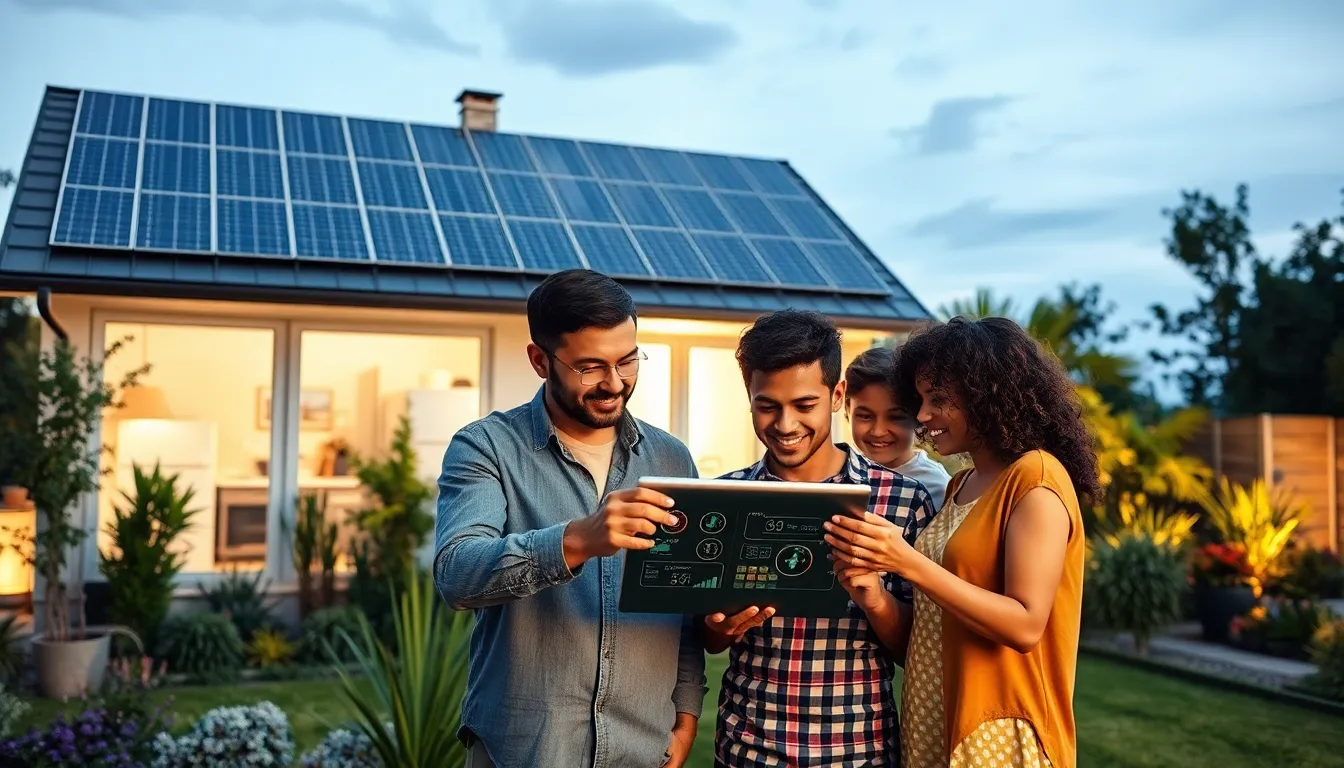In a world where energy bills can feel like a second mortgage, smart energy solutions are here to save the day—and your wallet. Imagine a life where your home knows when to turn off the lights and adjust the thermostat, all while you kick back and binge your favorite series. It’s not just a dream; it’s the future of energy management, and it’s smarter than your average bear.
From solar panels that soak up the sun’s rays like a sponge to energy-efficient appliances that practically pay for themselves, these innovations are changing the game. They’re not just good for the planet; they’re good for your peace of mind. So why not embrace the future and let technology do the heavy lifting? Dive into the world of smart energy solutions and discover how they can transform your home into an energy-saving powerhouse.
Table of Contents
ToggleWhat Are Smart Energy Solutions?
Smart energy solutions represent innovative approaches to energy management that enhance efficiency and sustainability. These technologies include smart thermostats, which automatically adjust temperatures based on user habits and external conditions. Solar panels generate renewable energy, significantly lowering electricity costs while reducing carbon footprints.
Energy-efficient appliances consume less power compared to traditional models. They incorporate advanced technologies that optimize performance, helping households achieve substantial energy savings. Smart meters provide real-time energy usage alerts, enabling users to monitor and manage their consumption effectively.
Additionally, energy storage systems, such as home batteries, store excess energy for later use. This capability encourages self-sufficiency and minimizes reliance on the grid during peak demand periods. Smart home networks integrate multiple devices, allowing for seamless communication and control over energy usage from smartphones or tablets.
Data analytics play a crucial role in smart energy solutions. Systems analyze consumption patterns, offering insights that lead to further optimizations. With this information, users can make informed decisions, enhancing energy efficiency across various areas of their homes.
Overall, adopting smart energy solutions fosters a proactive attitude toward energy management. They not only contribute to significant cost savings but also align with sustainable practices essential for environmental conservation. Embracing these solutions transforms living spaces into smarter, more responsive environments.
Benefits of Smart Energy Solutions

Smart energy solutions offer substantial advantages. These benefits encompass financial savings and environmental sustainability.
Cost Savings
Households can experience significant reductions in energy bills by implementing smart energy technologies. Smart thermostats optimize heating and cooling, adjusting automatically based on user preferences. Energy-efficient appliances, such as LED lighting and modern refrigerators, consume less power compared to traditional models. According to the U.S. Department of Energy, using energy-saving devices can cut home energy bills by 10% to 50%. Home batteries enable users to store energy generated from solar panels, reducing reliance on the grid. Overall, smart energy solutions create an efficient energy management system that results in lower utility expenses.
Environmental Impact
Smart energy solutions contribute positively to environmental health. Reduced energy consumption leads to fewer greenhouse gas emissions, which helps combat climate change. Solar panels harness renewable energy, providing clean power without pollution. Energy-efficient appliances minimize resource use during manufacturing and operation, promoting sustainability. Additionally, smart grids enhance energy distribution, lowering energy waste and improving reliability. A reduction in fossil fuel dependence supports global efforts toward greener energy practices. Collectively, these advancements foster a healthier ecosystem while fulfilling the needs of modern society.
Key Components of Smart Energy Solutions
Smart energy solutions encompass various technologies that improve energy efficiency and sustainability. Understanding these components enhances effective implementation.
Smart Meters
Smart meters enhance energy monitoring by providing real-time consumption data. They allow users to track energy usage patterns and adjust habits accordingly. With accuracy in measurements, smart meters facilitate better energy management decisions. Reports show that households using smart meters can reduce their energy costs by 10% to 15%. Customers receive alerts about peak usage times and potential savings opportunities, promoting energy conservation.
Renewable Energy Integrations
Integrating renewable energy sources such as solar panels plays a crucial role in smart energy solutions. Solar energy not only reduces dependency on traditional power grids but also lowers energy bills. Statistics indicate that homes equipped with solar systems may save between $20,000 to $30,000 over 20 years. Additionally, these installations contribute to a sustainable energy future by decreasing greenhouse gas emissions. Effective integration often involves energy storage systems that maximize the use of generated power.
Energy Management Systems
Energy management systems streamline energy consumption through effective monitoring and control. They analyze usage data and identify opportunities for improvement. Utilizing algorithms, these systems recommend adjustments to optimize energy efficiency. Research reveals that implementing energy management systems can lead to energy savings of up to 25%. By offering actionable insights, these tools empower users to make informed decisions about their energy use.
Challenges and Considerations
Smart energy solutions face various challenges that must be navigated for successful implementation.
Implementation Barriers
Regulatory hurdles often pose significant obstacles in adopting smart energy technologies. In many regions, existing energy policies may not support new innovations, resulting in delayed deployment. Financial constraints also hinder progress; upfront costs for installation can deter potential users. Additionally, lack of awareness about available solutions limits consumer participation in the market. Engaging with stakeholders and policymakers helps emphasize the importance of supportive legislation and incentives that can mitigate these barriers.
Technological Limitations
Technological limitations can restrict the effectiveness of smart energy solutions. Compatibility issues arise when integrating new devices with older systems, often necessitating costly upgrades. Connectivity challenges may also disrupt the performance of smart technologies, especially in areas with spotty internet access. Moreover, data security concerns make consumers hesitant to adopt solutions that require personal information. Addressing these limitations through collaboration among technology developers can enhance the overall reliability and appeal of smart energy applications.
Future of Smart Energy Solutions
Innovations in smart energy solutions promise to shape the way households manage energy consumption. Enhanced technologies, such as artificial intelligence and machine learning, are paving the path for greater energy efficiency. Consumers may experience advanced predictive capabilities that optimize energy use based on historical data and real-time conditions.
Increased integration of renewable energy sources is becoming essential. Solar energy systems are expected to expand, offering financial savings that can reach $20,000 to $30,000 over 20 years. These systems not only aid in creating a sustainable future but also reduce dependence on fossil fuels.
Smart energy management systems represent another significant advancement. Real-time monitoring and control will allow users to track and adjust their energy consumption more effectively. Beneficial insights gained from data analytics could result in energy savings of up to 25%.
Enhanced connectivity among devices will promote the automation of energy-saving actions. Through smart home networks, users can easily manage appliances and adjust settings remotely. Control over smart thermostats and energy-efficient appliances will lead to significant reductions in energy bills, which can decrease by 10% to 50%, depending on the technologies implemented.
Focus on regulatory and financial incentives is necessary to drive adoption. Collaborations among stakeholders, policymakers, and technology developers will help navigate potential barriers. Addressing consumer awareness and data security concerns remains imperative to foster trust and encouragement in new technologies.
The cumulative effect of these developments suggests a future where smart energy solutions become the norm in households. Embracing these advancements will enhance overall efficiency while promoting sustainability and cost savings for consumers.
Smart energy solutions represent a pivotal shift in how households manage energy consumption. By adopting these innovative technologies, individuals can enjoy significant cost savings while contributing to a healthier environment. The integration of smart devices not only simplifies energy management but also empowers users to make informed decisions about their consumption habits.
As advancements continue in this field, the potential for enhanced efficiency and sustainability grows. Embracing these solutions today sets the foundation for a more energy-conscious future. With the right support and awareness, smart energy solutions can transform everyday living into a more efficient and eco-friendly experience.






